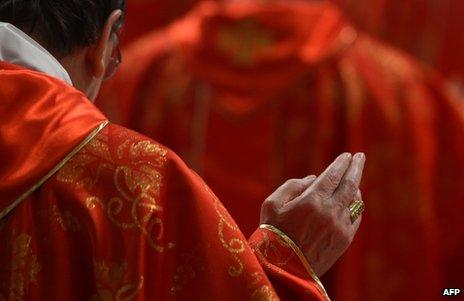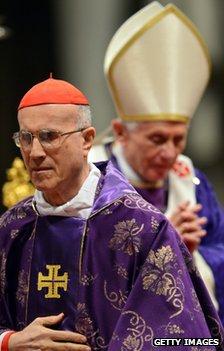Pope Election: Where the Conclave Really Divides
By Gavin Hewitt
In the cardinals' last meeting before the Conclave, there was tension and division. It was a reminder - if any was needed - that the choice of pope is not just about selecting the spiritual leader of the Roman Catholic Church. It is also about power. During Monday afternoon one of the most powerful brokers in the Vatican hierarchy returned to the sensitive subject of the Vatican Bank. Cardinal Tarcisio Bertone is not just the Vatican's secretary of state, he is one of the most influential figures in the Roman Curia, the bureaucracy. He had taken exception to some of the criticism of the running of the bank. The bank has been the source of scandal with concerns about money-laundering. Last week one of the Brazilian cardinals, Joao Braz de Aviz, criticised the management of the Vatican finances and his comments got in the papers. Cardinal Bertone accused him of leaking his criticisms. Not only did the Brazilian cardinal deny this but other cardinals applauded him. What these exchanges laid bare was that the Curia is at the heart of the decision as to who will be the next pope. The big divide is not between conservatives and liberals. In truth, there are very few liberals amongst the cardinals. The major division is between those who believe the Curia needs cleaning out and those who still defend the status quo. The reformers have become emboldened by an investigation into the leaking of papal documents. The 300-page report, which has not been distributed, is reported to have discovered deep-rooted problems in the Curia. Some of its members were apparently open to blackmail. The former pope was unable to confront these scandals and implement change. When he resigned, the North American cardinals and some Europeans began pushing for deep institutional reform. They blame the Curia for preventing a more radical response to the Church abuse scandal. The reformers have rallied behind Cardinal Angelo Scola from Milan. He is conservative, a close ally of the former pope, but not seen as an ally of the Italians who run the Curia. Over the first 24 hours of the Conclave, he will have to show momentum if he is to succeed. If he fails, the reformers may coalesce behind Cardinal Timothy Dolan from New York. The longer the Conclave continues the more open and unpredictable it will become. The Conclave is very much a struggle for the institutional heart of the Church.
|
.
Any original material on these pages is copyright © BishopAccountability.org 2004. Reproduce freely with attribution.

